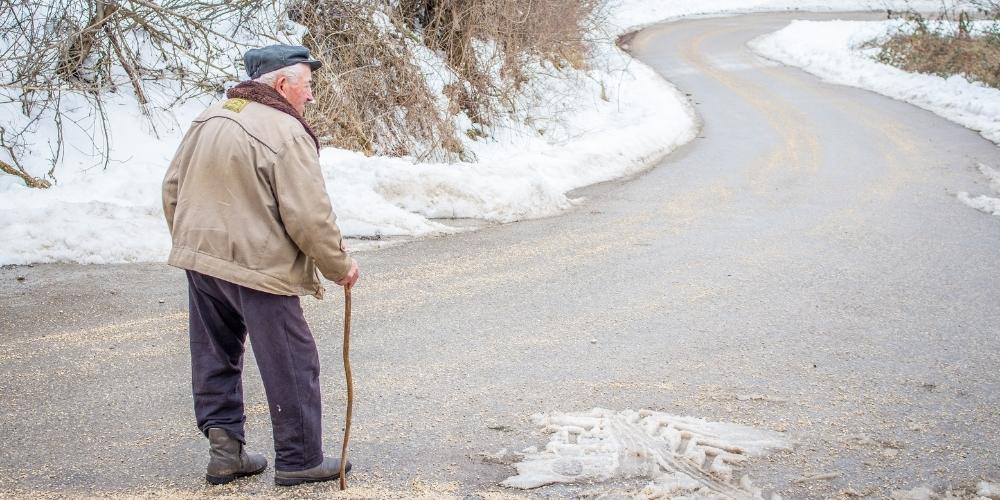
4 Ways to Reduce Fall Risks in Seniors
Sep 20 , 2021
Tags - Fall Risks in Seniors
It goes without saying - falls put you at risk of serious injuries.
Whilst fall prevention may not seem like an exciting topic, falls are one of the main causes of injuries in older adults.
In fact, it’s been found that one in five seniors that fall end up with scary complications, like broken bones or head injuries.
Not only that, but a report on Falls Prevention in Older Age by the World Health Organisation states that roughly 28-35% of adults aged 65 and over will fall each year, and this increases to 32-42% for those over 70 years old; simply, the frequency of falls increases with age.
Unfortunately, the fear of falling can keep someone from being active, thriving and living a good quality of life. Hence why it’s important to know how to lower your risk of falling through a few simple measures so this fear won’t have to rule your life.
Fundamentally, no matter how old or healthy you are, falls happen. And it’s because any changes or challenges to your body’s balance or strength will affect your ability to stay upright.
Luckily, when you’re younger you have a better ability to stay upright and if you do stumble, you can often catch yourself and recover but of course, the older you get, the harder this becomes.
Although it isn’t possible to reduce all falls, the good news is it is possible to take actions that can reduce the chance of a bad fall. Here are 4 ways to reduce fall risks in seniors.
1. Talk to your GP
The first step to fall prevention is to talk to your doctor who will be able to help discover any underlying reasons as to why you may be falling.
To begin, make a list of all medications you’re taking including prescriptions, over the counter medications and supplements. This way your doctor can review all of these for any side effects that are increasing your risk of falling and your doctor may need to replace them or consider weaning you off particular ones that affect how you think.
Secondly, if you’ve fallen before, write down all the details like when, where and how you fell over, including times where you managed to grab onto something to save yourself or where you were caught by someone as this will help your doctor identify specific fall prevention strategies.
Lastly, there can be certain health conditions that cause a fall, like eye or ear disorders. Here you will need to discuss with your doctor how comfortable you feel when you walk. For instance, do you feel dizzy? Do you feel any pain? Are you short of breath? Discussing these things will help your doctor evaluate your muscle strength, balance and walking style.
2. Exercise
Now it may be thinking, “surely I should move my body less so I don't fall?”
But actually, exercise will go a long way towards preventing falls. Gentle activities like small walks, water workouts or yoga can help to improve strength, balance, coordination and flexibility in your body and make it easier to catch yourself and stay upright.
Essentially, an active senior is less likely to fall as their body remains more stable as they age. If you’re not too sure where to start, speak with your doctor as they’ll be able to recommend an exercise programme tailored to your needs or refer you to a physical therapist who can advise specific workouts to do.
3. Light Up your Living Space
Generally speaking, as you get older your eyesight starts to diminish and seniors cannot always see that well in the dark or shadowed spaces.
And so it’s a good idea to keep your living space brightly lit to avoid tripping over objects that are hard to see. A few ways to do this is to
- Place night lights in bedrooms, bathrooms, stairs and hallways
- Have a side lamp next to your bed in case you need to get up in the middle of the night
- Consider glow in the dark light switches
- Turn the lights on before going up or down the stairs
- Have torches stored in an easy-to-find space just in case there’s a power cut
4. Wear Appropriate Shoes
Shoes play a huge part in reducing the risk of falls.
So check the soles of your shoes - are they non-slip? To stop you from gliding across slippery surfaces, durable rubber soles will have the best grip.
At the same time, shoes need to fit properly and feel comfortable; they should not be too tight or loose, which can help reduce other symptoms like foot joint pain.
Plus, consider how shoes are tied - velcro straps will be a lot easier to wear and removes the risk of tripping over long laces.
The Bottom Line
It’s important to understand that whether it happens once or if falls are more frequent, in the elderly it can be a serious matter.
In some cases, a senior who’s fallen may become scared, confused and even resistant to talk about their experience so family caregivers should show their support and appreciate the risk; respond positively and help the senior in any way possible, working with their capabilities to introduce strategies that will lower their risk of falling.
Please get in touch for more information.
Check our extended range of Comfortable Shoes in the meantime.
You may also like:
